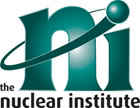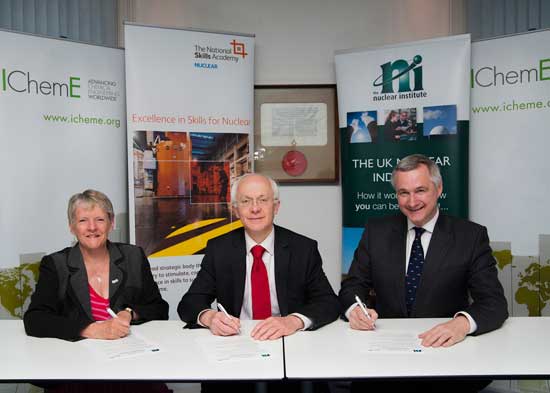
Nuclear Institute - Press Release
Tuesday 5th March 2015: FOR IMMEDIATE RELEASE

Three leading players on the nuclear skills landscape have joined forces to sign a new collaborative agreement that promotes the highest standards of professionalism across the UK’s nuclear industry.
The agreement, which is supported by the Nuclear Institute (NI), the National Skills Academy Nuclear (NSAN), and the Institution of Chemical Engineers (IChemE), will facilitate closer alignment between the three organisations in a coordinated effort to encourage new entrants to the nuclear sector.

John Warden, CEO of the Nuclear Institute, said:
"Closing the skills and knowledge gap facing the industry is a crucial task. We need to secure a new generation of skilled nuclear professionals to meet the energy demands of a growing population. The Nuclear Institute has always been committed to promoting the highest standards of professionalism and we are very much looking forward to deepening our relationship with NSAN and IChemE to develop careers and show young people the exciting opportunities that are available to them."
The collaboration has been positively received by Mr. John Clarke, CEO of the Nuclear Decommissioning Authority, who said:
“The highest standards of nuclear professionalism are required to ensure a safe and secure nuclear future for the UK. I am delighted that NSAN, IChemE and the Nuclear Institute are formally collaborating to address this need.
Mr. Clarke went on to praise the interdisciplinary collaboration as a model for how future growth in the nuclear industry will be accomplished with safety and professionalism to the fore:
“In particular, the development of a joint membership offer between the Nuclear Institute and IChemE is an excellent development bringing together technical disciplines and nuclear sector specific requirements. I am confident that this will have a significant impact in terms of raising and recognising nuclear professionalism across the industry.”
The Nuclear Energy Skills Alliance’s Workforce Assessment Model reports that the total workforce in nuclear is expected to grow from 70,000 to 98,000 by 2021. Direct supply chain support for Operations, Decommissioning, Engineering, Construction, and Defence is forecast to require recruitment for 3,000 technical roles and 3,500 professional roles per year for current plans to be met. The Manufacturing workforce required is also expected to grow significantly to 8,500 from 4,000 reported in 2014.
However, despite this high demand for new recruits, a 2014 survey, completed by the Nuclear Industry Association (NIA), of more than 1,300 young people studying science, technology, engineering or maths subjects revealed that more than one third of respondents did not believe they could work in the nuclear industry. Moreover, one in seven questioned had not heard anything about career opportunities in the nuclear sector.
The new collaboration will address this knowledge gap head-on and promote the nuclear industry as an exciting career path.
The collaborative agreement was signed ahead of the nuclear skills summit meeting in London on April 29th. The partners’ first work programme will be published later this year.
|

